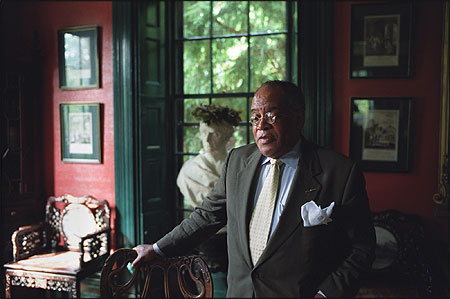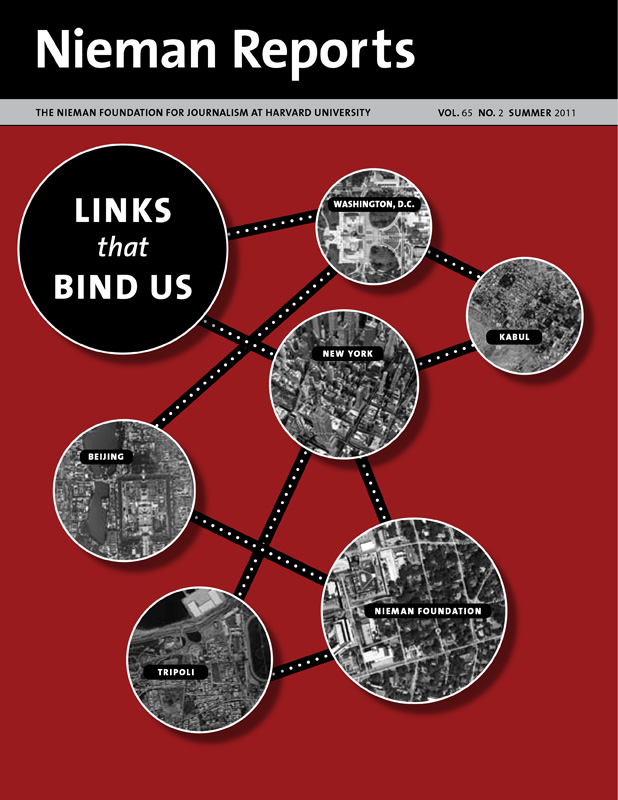
The late Rev. Peter J. Gomes served in Harvard’s Memorial Church for more than 40 years, preaching, teaching, and being a good friend to many on campus. Photo by Kris Snibbe/Harvard staff photographer.
I don’t remember the exact words on the sign, only that the title of the sermon sounded hopeful. Hopeful and a touch of humor—two things I needed as I began my adventure at Harvard as a Nieman Fellow. I do remember it was a Friday, one of those beautiful late September days in Harvard Yard, leaves crunching under my feet as I passed Memorial Church, sun slipping down, my thoughts far, far away.
I ended up back at the brick and white church two days later, a bit better dressed but still lost in thought. At first, the spaciousness of the church’s interior and grand engraved war memorial to Harvard alumni caught my attention. Then the sound of organ pipes jolted me to the fact that I was attending a church service for the first time in years on a day that was neither Easter morning nor Christmas Eve. Why? I had no idea. Until a soothing baritone voice sounded from the front and a short, stout bespectacled man I could barely see took his place behind the pulpit. Oh, how I heard him—his New England cadence, his exacting phrases, his unusual mix of historical references, humorous remarks, and his oft-irreverent asides about the most revered of institutions he held so dear—Harvard.
I knew immediately that my first encounter with the Rev. Peter J. Gomes was not to be my last. He became an important aspect of my life as a Nieman Fellow, memories that came rushing back when I heard of his death on February 28 from complications of a stroke. He was 68.
Fifteen years ago, I became just one of Gomes’s many fans on campus, the ones who were enthralled with the man and his many identities—black, gay, Yankee, Republican, Baptist. What? He was a man once quiet about such things who openly declared on behalf of students and others being taunted in 1991 that he was gay (but celibate); a Republican who prayed with presidents Ronald Reagan and George H.W. Bush, then turned Democrat when his friend Deval Patrick ran for governor of Massachusetts; a descendant of slaves who loved his Anglo-Saxon Protestant hometown, Plymouth, Massachusetts and its Mayflower Society.
By refusing to be put in anybody’s else’s box, Gomes was perhaps "the freest man I have ever known," Patrick told a packed memorial service for the preacher who held forth at Memorial Church for four decades. I couldn’t make it to that April 6 service. But I imagine it was filled with people like me who needed to thank a man, a minister, who helped them believe again—whether it be in God, life, love.
A Time of Loss
I don’t remember exactly what the minister said back on that particular fall morning, only the feelings it evoked—feelings long lost to my struggle coping with the dual feelings of sorrow and elation, life and death, the past and the present. Niemanhood was supposed to be a break from deadlines, reporting and Life as We Knew It for me and other fellows. I had no trouble shaking off the daily news part—but the daily life proved challenging.
My brother and father had died within months of one another in 1995. In fact, I got the call from Lippmann House to tell me that I was a Nieman finalist on the day my brother died of a heart attack. At the time, I was living in my childhood home near Buffalo, New York, and packing up 40 years and six children’s worth of memories for my parents. The plan was to sell the house and move mom and dad to a retirement home in Seattle, Washington where my older sister and brother had lived for decades, and then I would return in six weeks to my job at the Albuquerque Tribune.
Three months later I was still home and by that time I was parenting my own parents—a role for which I, at 35, was woefully unprepared. My mother had no desire to do anything; she had just lost her developmentally disabled son who had lived in a group home three blocks away and visited whenever he could. My father faded before my eyes, slowed and angered by the ravages of congestive heart failure and symptoms associated with Parkinson’s disease. A doctor and still mentally sharp, he knew time was running out but he never spoke of it—or of anything much at all, for that matter. He died June 24, 1995, just months after moving to a new state, city and home and months before I was to do the same.
I spent the first few weeks of my Nieman year walking and roaming and crying in the dark. I walked and walked around the neighborhoods near my apartment on Hancock Street long after the wining and dining and discussions of another Nieman day had ended. So after that first sermon at Memorial Church I knew I had finally found someone to talk to.
Gomes hugged, he laughed, he greeted each member of his congregation with such joy as they exited the church. I couldn’t help but be affected by his sheer enthusiasm for life. So I timidly approached him, revealing that I was a newcomer, a Nieman Fellow, and in need of grief counseling all in one rushed incomprehensible sentence. "Nieman" was the word he heard. It produced a hug and a classic Rev. Gomes response, "Well, a Nieman Fellow. They don’t come by here too often! To what do I owe this great honor?" " Now those words I do remember because I told him it was his sermon sign that reeled me in.
He invited me to Sparks House, the big yellow house that I had passed by so often, and I experienced his formal weekly teas with proper china and manners and the most amazing collection of antique furnishings. At a private counseling session he spoke of fathers and daughters and unresolved issues. I talked, he listened. I stopped walking around in circles at midnight. And I kept a date with him most Sunday mornings. The sound of his voice, his laughter, his reading of Scripture, his delightful candor juxtaposed against the soaring windows, the white columns, the rising stir of choral voices, settled me and my sorrow. I looked forward to the quick hug and "Well, hello!" on the steps after the service.
I returned a few more times to Sparks House as part of the Wednesday afternoon teatime throng. And, as was his usual practice, Gomes extended an invitation to the entire Nieman class to tea and made a point of meeting each and every one. There once was a time when the Nieman curator would invite Gomes to be one of the weekly guest speakers at Lippmann House but Gomes told me that it hadn’t happened in quite a while. Then with that Gomes gleam in his eye and conspiratorial chuckle in his throat, he said, on more than one occasion: "Probably has something to do with bringing a man of God into a den of journalists."
Bless his heart, as I learned to say in the South. And thanks be to that sign, whatever it said.
Patricia S. Guthrie, a 1996 Nieman Fellow, is a print reporter in transition who is freelancing from Seattle, Washington. She can be reached at freepsg@gmail.com.


